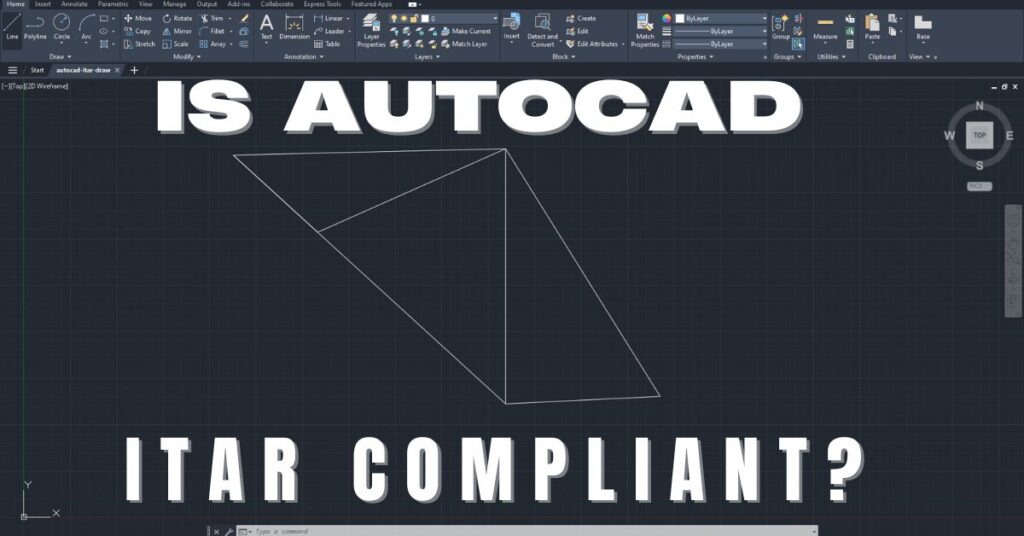How Does Your ITAR Compliance Program Measure Up?
The ITAR is a set of regulations governing the export and import of defense-related articles and services on the USML. It also regulates how technical data related to these defense articles and services. ITAR compliance is essential for companies that deal with defense articles, technical data, and defense services. Non-compliance can result in severe consequences, including civil fines and criminal penalties.
So, how does your ITAR compliance program measure up? Below are some key elements to consider:
Knowledge of ITAR Regulations
To establish an effective ITAR compliance program, you must have a thorough understanding of the regulations and their requirements. This includes staying up-to-date on any changes to the regulations, which are subject to frequent updates. However, ITAR is complex and can be difficult to navigate without a solid understanding of the legal and regulatory landscape. Therefore, companies must invest in resources and training to fully understand the dictates of the regulation. This could involve hiring compliance experts, attending industry seminars, or subscribing to regulatory update services. By thoroughly understanding the ITAR, companies can avoid costly penalties and maintain a strong reputation in the defense industry.
Designated ITAR Compliance Officer
You should appoint a designated ITAR compliance officer who will be responsible for ensuring the company complies with the regulations. This person should have a strong understanding of the regulations and be trained on the specific requirements and procedures for your company. The role of an ITAR compliance officer is critical in maintaining compliance with the regulations. This individual should have a comprehensive understanding of the company’s operations, products, and services, as well as the specific requirements of ITAR. They should also have strong communication skills to effectively relay information about ITAR compliance to other employees and stakeholders. The officer should also undergo regular training to ensure they stay current with any changes in ITAR regulations.
Written ITAR Compliance Procedures
Your company should have written ITAR compliance procedures, including guidelines for exporting defense articles, services, and technical data. These procedures should be easily accessible to employees and regularly reviewed and updated. Clear, written procedures are crucial for ensuring all employees understand their responsibilities under ITAR. The procedures should cover all aspects of ITAR compliance, from identifying controlled items to record-keeping requirements. They should also provide clear instructions on what steps to take in various scenarios, like when an export license is required or violation is suspected. Regular reviews and updates of these procedures are necessary to ensure they remain current with changes in regulations or business operations.
Employee Awareness and Training
Employee awareness and training are critical components of an effective ITAR compliance program. Employees must be aware of the ITAR regulations and their role in ensuring compliance. You should give all employees regular training on ITAR compliance, not just those directly involved in export activities. This is because violations can occur at many organizational levels, from sales and marketing to shipping and customer service. However, the training programs should be tailored to different employees’ specific roles and responsibilities and updated regularly to reflect changes in regulations.
Screening and Due Diligence
Thorough screening of customers, partners, and suppliers to ascertain their eligibility to handle ITAR-controlled item is the first line of defense in ensuring ITAR compliance. It involves verifying the identity of the parties involved and their eligibility to handle ITAR-controlled items. This process helps prevent unauthorized access to sensitive information and technology. In contrast, due diligence involves a comprehensive investigation of the various parties to a transaction. It aims to verify the intended end-use and end-user of the ITAR-controlled items and services. This process is crucial in ensuring that these items and services are not used for prohibited activities. Thus, it is important that you ask detailed questions about the intended use of the products or services. Inquire about the nature of the project, the destination of the goods, and any potential third-party involvement.
Record Keeping
Accurate and comprehensive record keeping is not just a requirement, but a cornerstone of an effective ITAR compliance program. It involves maintaining detailed records of all transactions involving ITAR-controlled exports and imports. This includes, but is not limited to, sales contracts, shipping documentation, technical data, correspondence, and licensing determinations. But why is Record Keeping Essential? These records serve as a testament to the organization’s adherence to ITAR regulations. They provide transparency and accountability, ensuring that all activities are conducted within the legal framework. Moreover, these records must be readily accessible and available for review by the U.S. Department of State upon request.
Regular Reviews and Audits
Conducting regular internal audits of your ITAR compliance program is crucial for maintaining the integrity of your operations. These audits serve to identify any potential areas for improvement, ensuring that your organization remains in line with ITAR regulations. An audit involves a thorough examination of all aspects of your ITAR compliance program. This includes reviewing documentation, inspecting physical security measures, and assessing the effectiveness of training programs. The goal is to identify any gaps or weaknesses that could potentially lead to non-compliance.
The results of an ITAR compliance program audit provide valuable insights into the effectiveness of your current procedures. It also highlights areas where improvements can be made. These findings should be used to update and enhance your ITAR compliance procedures, thereby reducing the risk of violations. Measuring the effectiveness of your ITAR compliance program is essential to ensure that your company is fully compliant. Regularly reviewing and updating your program can minimize the risk of ITAR violations and maintain compliance with the ITAR.
An Effective ITAR Compliance Program is Critical
In conclusion, having a robust and effective ITAR compliance program is essential for companies dealing with defense-related articles and services. By implementing the key elements discussed above, your company can achieve ITAR compliance and minimize the risk of violations. However, compliance is an ongoing process that requires regular review and updating. Therefore, it is important to have a designated ITAR compliance officer who can oversee the program and ensure that it is up-to-date and effective.
If you haven’t already established an ITAR compliance program, it is important to start taking steps to do so. If you have an existing program, review and update it regularly to ensure it is up-to-date and effective. Do you need guidance or assistance in developing or improving your ITAR compliance program? We at Cleared Systems can help. By prioritizing ITAR compliance, you can protect your company from the consequences of non-compliance and maintain a strong reputation within the DIB.
Share in Social Media
See More Case Studies

Securing Defense Contracts: A DFARS 252.204-7012 Compliance Case Study
Discover how Cleared Systems helped a Federal Contractor successfully achieve DFARS 252.204-7012 compliance by strengthening its cybersecurity posture, giving it a competitive edge when bidding for DoD Contracts.

What is GCC High? For ITAR & CMMC 2.0
Microsoft 365 Government Community Cloud (GCC) High is a specialized cloud solution tailored for U.S. federal, state, local, tribal, and territorial government organizations, as well as for contractors who hold or process data subject to specific security regulations. In this article, we will explore the features, benefits, and differences between Microsoft 365 GCC High and other Office 365 offerings.

Is AutoCAD ITAR Compliant? A Comprehensive Guide for Defense Manufacturers
Defense contractors and manufacturers working with sensitive military technologies face a critical question when selecting computer-aided design software: Is AutoCAD ITAR compliant? This question becomes

How to Get Help in Windows: Guide to Security and Compliance Support
In today’s digital landscape, ensuring your computer systems are secure and compliant with industry regulations is essential for both businesses and individuals. Windows, as one

Microsoft Copilot for GCC High: Enhancing Security and Compliance
In today’s fast-evolving digital landscape, organizations that handle sensitive data, particularly those in government sectors or defense contractors, face growing pressure to maintain strict security
Partner with Us for Compliance & Protection
We’re happy to answer any questions you may have and help you determine which of our services best fit your needs.
Your benefits:
- Client-oriented
- Security
- Compliance
- Peace of mind
- Efficiency
- Trust
What happens next?
Schedule an initial meeting
Arrange a discovery and assessment call
Tailor a proposal and solution
